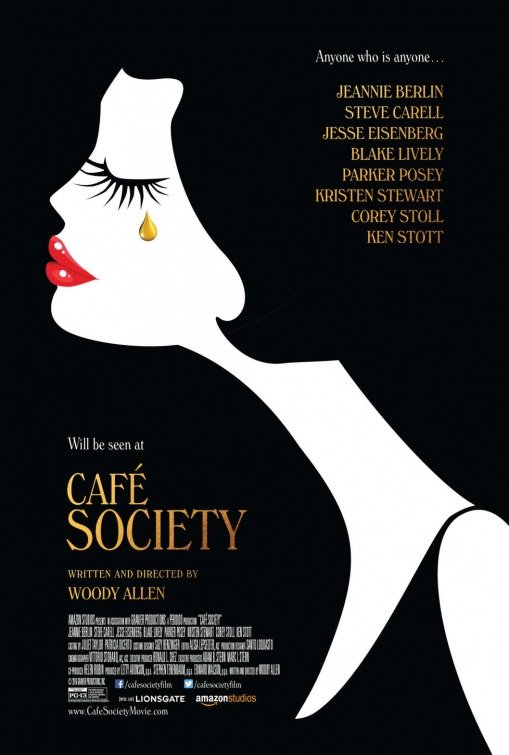“Lost Opportunities and Regrets”

| None | Light | Moderate | Heavy | |
|---|---|---|---|---|
| Language | ||||
| Violence | ||||
| Sex | ||||
| Nudity |
What You Need To Know:
The ending to CAFÉ SOCIETY is very poignant and wistful. It has a powerful, almost heartbreaking appreciation for the pain of lost opportunities and regrets. A better script and better acting could have made this even more powerful. Not that the writing or acting are bad. Far from it. CAFÉ SOCIETY doesn’t advocate adultery, but it contains a lot of strong foul language, some immoral behavior and violence. So, MOVIEGUIDE® advises extreme caution despite the movie’s worthwhile qualities.
Content:
(RoRo, B, CC, AB, FR, LL, VV, S, A, D, MM) Strong Romantic worldview as circumstances, bad decisions and social conventions keep a young couple apart and lead to other bad consequences, mitigated by some moral elements, plus a side character repents of his violent life of crime and becomes a Christian, but the conversion is a jailhouse conversion that’s not entirely believed and treated skeptically, and Jewish characters say Judaism teachers there is no afterlife; five light obscenities, 11 strong profanities using Jesus Christ or some variation and four light profanities; strong brief violence includes man with shaving cloth over his face while sitting in barber chair has his throat slit, gangsters grab man off streets and dump him in pit before pouring concrete over his apparently dead body, gangsters dump another body in a similar pit and pour concrete over his body, neighbors have confrontation over loud radio, another mob hit; no depicted sex but implied adultery when married man and his mistress mention hotel rooms where they spent night together, man has first-time prostitute visit his hotel apartment, but the two have a comical misunderstanding, and she leaves, it’s vaguely implied unmarried couple may be sleeping together, protagonist’s new girlfriend gets pregnant, and they decide to get married, and brief innuendo; no nudity; alcohol use; smoking; and, lying, people keep secrets from their spouses, rude behavior, gangsterism, obsequious behavior, snobbery, jealousy.
More Detail:
Set in the 1930s, the movie opens with young Bobby Dorfman’s mother in New York City asking her brother, Phil, to find a job for Bobby in Hollywood. Bobby soon begins working odd jobs for Uncle Phil, but becomes immediately smitten with Phil’s secretary, Vonnie, short for Veronica. Vonnie tells Bobby she already has a boyfriend, but they still become good friends.
The boyfriend turns out to be Uncle Phil, who’s already married. Phil’s torn over leaving his wife, however, so he breaks off the relationship. So, Bobby, who still doesn’t know about the adulterous affair, finally is able to convince Vonnie to love him.
However, Phil suddenly changes his mind. Now, Vonnie has a choice to make, but she chooses Phil because Bobby wants the two of them to live in New York.
Years later, Bobby is working as the manager of his gangster brother Ben’s successful nightclub. Bobby married another girl, who coincidentally also is named Veronica. One night, Vonnie comes into the nightclub with Phil, who’s in New York to make some major business deals. Vonnie and Bobby resume their friendship, but will it develop into something more?
The ending to CAFÉ SOCIETY is very poignant and wistful. It has a powerful, almost heartbreaking appreciation for the pain of lost opportunities and regrets. The movie’s last shot captures all this extremely well. A better script and better acting could have made this even more powerful. Not that the writing or acting is bad. Far from it. However, the script goes off on a few tangents and is a bit long. Also, the two leads, Jesse Eisenberg and Kristen Stewart, don’t have enough chemistry together to lend their story the gravitas it needs to carry out Woody Allen’s apparent vision.
CAFÉ SOCIETY also has a lot of gratuitous foul language, especially some strong profanities. At one point in the movie, a character even repents of their violent life of crime and becomes a Christian, but the movie appears to present a cynical subtext about this conversion. Also, at another point, Jewish characters say Judaism does not teach an afterlife. This may be true of some, many or even most Jewish believers, but not the traditions of the Jewish faith. In fact, several passages in the Torah itself, the five books of Moses, teach an afterlife (see Genesis 25:8 and 35:29 and Deut. 32:50).
Despite the adulterous aspects to part of the storyline in CAFÉ SOCIETY, the movie doesn’t advocate adultery. Instead, the movie suggests Phil should have stayed with his wife, and Vonnie should have gone with Bobby to New York City instead. That’s what the movie’s ending suggests. As such, the ending to CAFÉ SOCIETY seems to be telling viewers to seize the opportunities presented to you before you do something you may regret later. There’s a Romantic aspect to this message, but it can also have a moral lesson.
Ultimately, however, CAFÉ SOCIETY warrants extreme caution, because of some moral ambiguity plus the movie’s occasional examples of strong foul language. CAFÉ SOCIETY also has a scene where a lonely Bobby breaks down and abandons his principles to hire a prostitute to visit his hotel apartment, but the two have a comical misunderstanding, and she leaves.


 - Content:
- Content: 


